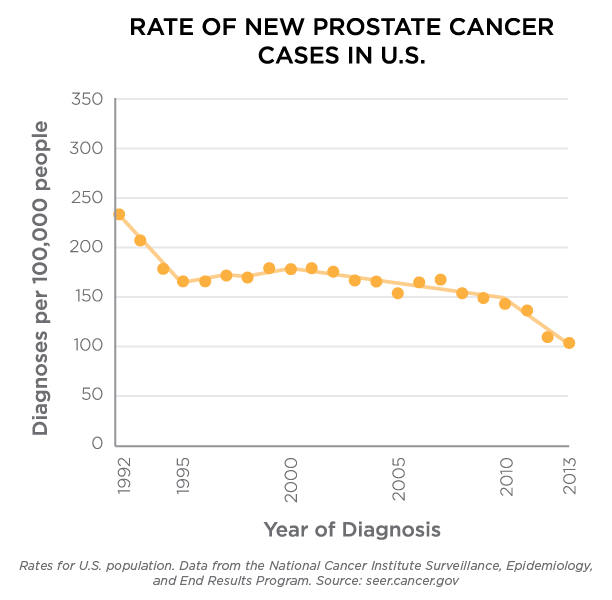As Prostate Cancer Rates Decline, Number of Survivors Grows
Rates of prostate cancer in the U.S. have declined in recent years, but it remains one of the most commonly diagnosed cancers in men, with about 200,000 new diagnoses every year.
More than 2.8 million American men are living with prostate cancer. Thanks to improvements in early detection and treatment, 99 percent of prostate cancer patients now survive for at least five years. But despite the rising survival rate, nearly 30,000 men die of prostate cancer each year.

Source: National Cancer Institute Surveillance, Epidemiology, and End Results Program. seer.cancer.gov
What are the risk factors for prostate cancer?
- Age: Men over 50 years old have the greatest risk.
- Black men are at higher risk than men of other races.
- Family history of prostate cancer greatly increases a man's chances of getting the disease.
- Prolonged high levels of testosterone.
- Dietary supplements of vitamin E, folic acid and calcium. Vitamin and mineral supplements are generally not recommended unless you have a specific deficiency.
- Pesticide exposure.
- Eating red meat and a high-fat diet.
Exposure to high levels of arsenic, cadmium and bisphenol A, all of which are linked to prostate cancer in animal studies.
Prevention tips
Screening and early detection are extremely important. Early stage cancers can be very treatable and slow-growing tumors may only require monitoring. Debate continues about the age at which screening should begin and who should be screened. Tests for PSA – prostate-specific antigen – can return high rates of false positives. The benefits and risks of screening, based on your specific circumstances, should be discussed with your doctor. Below are some other things you can do:
- Limit consumption of red meat and fat.
- Consider alternatives to pesticides around the home. Mulch, landscaping fabrics and homemade solutions containing vinegar and soap can suppress weeds. Control insects by keeping a clean, dry home. Consider organic options for fruits and vegetables that have high levels of pesticide residues.
- Use EWG’s tips for limiting your exposure to bisphenol A.
- Filter your water. In some areas, arsenic is a natural water contaminant; consider buying a filter certified to remove arsenic. Arsenic also builds up in some foods, such as rice.
- Stay physically active.